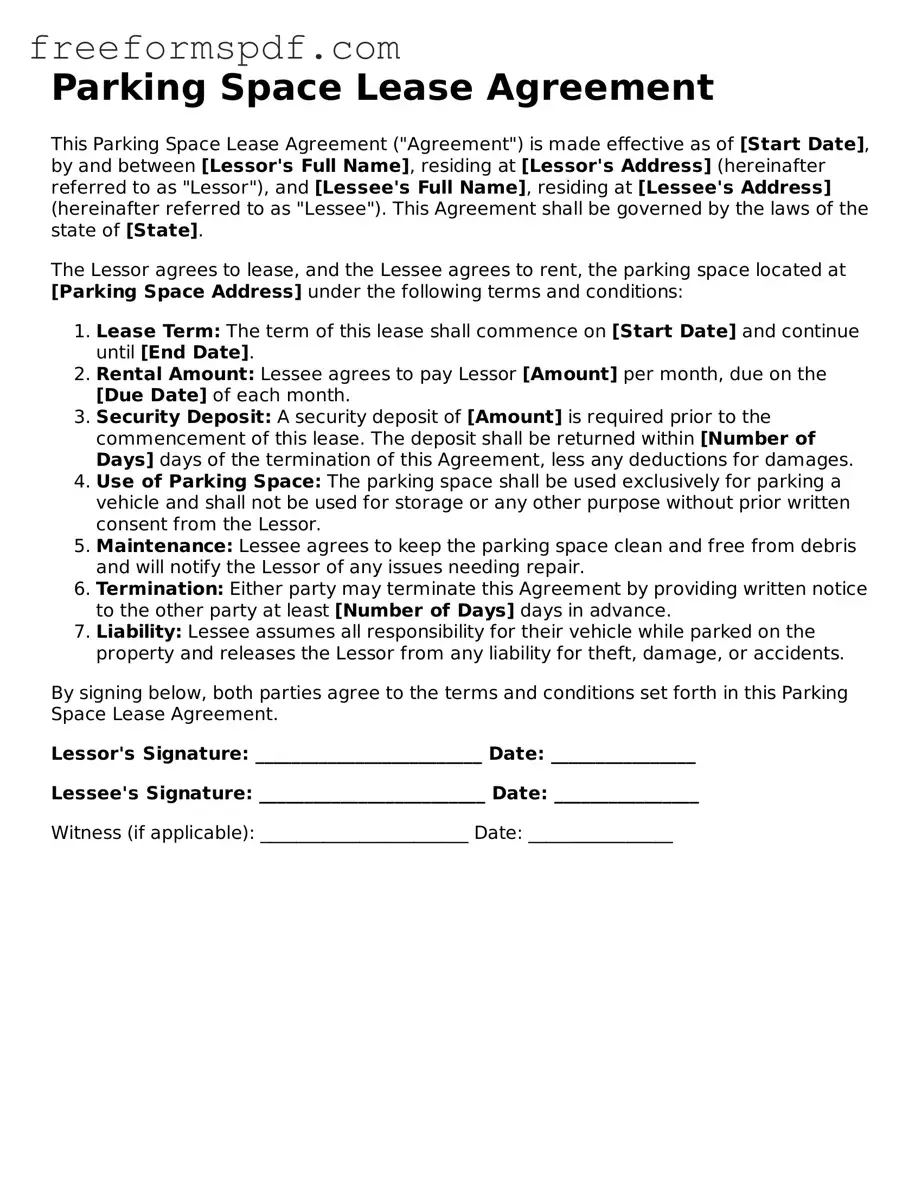Parking Space Lease Agreement Document
Common mistakes
-
Incorrect Personal Information: Many people forget to double-check their name, address, and contact details. A simple typo can lead to confusion and delays.
-
Not Specifying the Lease Term: Some individuals neglect to clearly state the start and end dates of the lease. This can result in misunderstandings about how long the parking space is reserved.
-
Ignoring Payment Details: Failing to include the payment amount and due dates is a common mistake. It’s important to outline how much is owed and when payments should be made.
-
Overlooking Signatures: People sometimes forget to sign the agreement or have the landlord sign it. Without signatures, the lease may not be considered valid.
Learn More on This Form
-
What is a Parking Space Lease Agreement?
A Parking Space Lease Agreement is a legal document that outlines the terms and conditions under which one party (the lessor) allows another party (the lessee) to use a designated parking space for a specified period. This agreement typically includes details such as the location of the parking space, the duration of the lease, payment terms, and responsibilities of both parties.
-
Who needs a Parking Space Lease Agreement?
Anyone who wishes to rent out or lease a parking space can benefit from this agreement. This includes property owners with available parking spots and individuals or businesses looking for a reliable place to park their vehicles. It is particularly useful in urban areas where parking is limited and can help prevent disputes over parking rights.
-
What should be included in the Parking Space Lease Agreement?
- Identification of the parties involved (lessor and lessee).
- Description of the parking space, including its location and any specific identifiers.
- Lease term, specifying the start and end dates.
- Payment details, including the amount, due dates, and accepted payment methods.
- Responsibilities of both parties, such as maintenance of the space and liability for damages.
- Conditions for termination of the lease and any penalties for early termination.
-
How can disputes be resolved in a Parking Space Lease Agreement?
Disputes can be resolved through various methods as outlined in the agreement. Common approaches include direct negotiation between the parties, mediation, or arbitration. It is advisable to include a clause in the lease agreement that specifies the preferred method of dispute resolution. This can help streamline the process and reduce potential legal costs.
Misconceptions
Understanding a Parking Space Lease Agreement is crucial for both lessees and lessors. However, several misconceptions often arise regarding this type of contract. Below is a list of common misunderstandings and clarifications to address them.
-
All parking space leases are the same.
This is not true. Each lease can vary significantly based on location, terms, and specific agreements made between the parties involved.
-
A verbal agreement is sufficient.
While verbal agreements can be made, they are difficult to enforce. A written lease provides clear terms and protects both parties.
-
Once signed, the lease cannot be changed.
Amendments can be made if both parties agree. It is important to document any changes in writing.
-
Parking space leases do not require a deposit.
Many leases include a security deposit to cover potential damages or unpaid rent. This is a common practice.
-
Only the lessee is responsible for maintenance.
Maintenance responsibilities should be outlined in the lease. Both parties may have obligations depending on the terms agreed upon.
-
Parking space leases are only for long-term use.
Leases can be structured for short-term or long-term use, depending on the needs of the parties involved.
-
You cannot sublease a parking space.
Subleasing may be allowed if the original lease permits it. Always check the terms before proceeding.
-
A lease guarantees a specific parking spot.
Some agreements may specify a designated spot, while others may allow for general access to a parking area. Clarity is key.
-
Parking space leases are not legally binding.
These agreements are legally binding documents. It is important to understand the terms before signing.
Clarifying these misconceptions can help ensure a smoother leasing experience for all parties involved. Always consider seeking guidance if there are uncertainties regarding the lease agreement.
Other Types of Parking Space Lease Agreement Forms:
Letter to Terminate Tenancy - This document may include any requests for forwarding mail or accommodation for future contact.
Utilizing the Arizona Lease Agreement form is essential for both landlords and tenants to clearly define the rental terms and obligations in Arizona. As an important legal documentation, it helps facilitate a transparent renting process and aids in avoiding misunderstandings. For those seeking a reliable resource to access this form, visit Arizona PDF Forms to obtain detailed guidance and necessary documentation.
